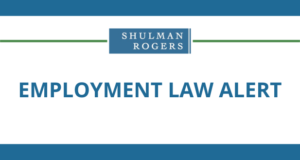April 3, 2025

|
2025 Update on Virginia Employment Laws Virginia’s Legislative Session for 2025 adopted several bills potentially impacting employers and their employees. Governor Youngkin had until Tuesday, March 25th to act on these bills – by signing or vetoing them (or allowing them to become law without his affirmative endorsement). Here’s how a few of the most noteworthy and potentially impactful bills for Virginia employers fared:
As the “Low Wage” Employee Salary Threshold Barring Non-Competes Expands So Does a Virginia Employer’s Potential for Violation and Liability
Virginia’s “low wage” salary threshold by which employers are precluded from imposing employee non-compete restrictions had already been increased by the new average weekly wage of $1,463.10, or $76,081 annually, for 2025. However, with the Governor’s express consent, effective July 1, 2025, this salary threshold ban will now include non-exempt as well as exempt employees. These continuing expansions mean the number of employees in Virginia who may be subjected to non-compete restrictions continues to be reduced. While this latest change only applies to restrictions imposed on or after July of 2020, it still increases an employer’s potential liability, which brings civil penalties of up to $10,000 per violation in addition to an individual’s damages, attorney’s fees and costs. Key Takeaway: While non-competes, non-solicitation and non-disclosure restrictions live on – albeit with increasing limitations and scrutiny – employers are advised to stay up-to-date on state and federal laws (and now, executive orders) governing these limits and each employer’s obligations.
Still No: Employee Paid Sick Leave or Annual Minimum Wage Increases
Notwithstanding the Virginia Legislature passing Bills to establish paid employee sick leave for those employed by either private employers or state/local governments, Governor Youngkin vetoed this compulsory obligation, preferring to leave it in the hands of employers as to whether or not they offer this as part of their employee benefits. Similarly, after the House and Senate passed Bills raising the minimum wage in each of the next two years and, thereafter, annually through an adjusted state hourly wage methodology, the Governor vetoed these mandated increases, preferring free market factors to influence and adjust compensation levels reflecting both regional and other economic differences. |
CONTACT |
MORE INFORMATIONThe contents of this Alert are for informational purposes only and do not constitute legal advice. If you have any questions about this Alert, please contact the Shulman Rogers attorney with whom you regularly work or a member of the Shulman Rogers Employment and Labor Law Group. To receive Employment Law Alerts and other timely news and information from Shulman Rogers, please click HERE to subscribe. |
Stay up to date with all the latest news and events.
